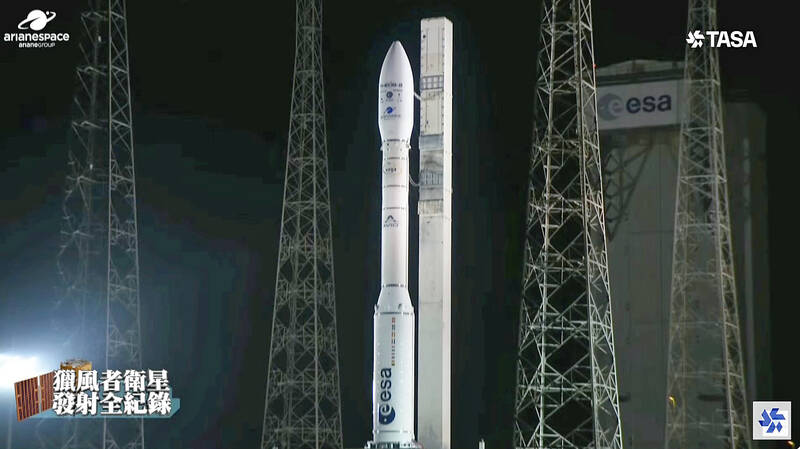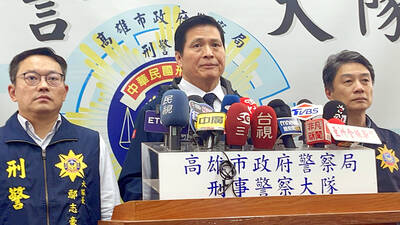Taiwan’s first home-grown weather satellite established communication with Taiwan for the first time on Monday night after being launched earlier in the day, the Taiwan Space Agency (TASA) said.
The satellite, called Triton, made its first contact with the ground station in Hsinchu as it passed over Taiwan at 8:56pm on Monday, TASA said.
Triton, which weighs 250kg, was launched from French Guiana at 9:37am on Monday Taiwan time as part of an Arianespace Vega C rideshare mission.

Photo courtesy of the Taiwan Space Agency
The satellite successfully entered orbit at 10:31am at an altitude of 601km, TASA data showed.
TASA Director-General Wu Jong-shinn (吳宗信) said that based on the data received, the satellite’s condition, including its temperature and power, was within expectations.
Speaking to reporters at TASA’s office in Hsinchu earlier in the day, Wu said the launch was Taiwan’s first foray into domestically engineered weather satellites made with components designed and manufactured locally.
The satellite’s name was inspired by Greek mythology. Triton, the son of Poseidon — the god of the sea — inherited a trident that symbolized maritime domination, and wielded a conch with the power to command the wind and the waves.
As the name suggests, Triton’s main objective is to measure wind data not by the standard method of taking photographs of atmospheric layers, but by measuring wind speed based on signals from ocean surfaces, Wu said.
The system, called Global Navigation Satellite System Reflectometry (GNSS-R), determines wind strength by analyzing the sea surface data. The calmer the sea, the stronger the signal, indicating weaker winds.
Triton is only the fourth satellite in the world to have its primary mission oriented around a GNSS-R scientific payload, Wu said.
Its data, which include wavelengths and wind speeds, can complement wind field information from ground radar, enhancing the accuracy of typhoon trajectory predictions and heavy rainfall.
The satellite would initially focus on monitoring areas at low northern hemisphere latitudes of the Indian, Atlantic and Pacific oceans, which are prone to severe weather, Wu said.
Its mission would expand to cover the southern hemisphere, he said.
Asked what is next for TASA, Wu said the agency is in the process of developing six high-resolution optical satellites, collectively known as the Formosat-8 constellation.
The agency is also planning to leverage the advantages of Taiwan’s semiconductor industry to build rockets with the goal of launching Taiwan-manufactured satellites into low Earth orbit within the next six to seven years, he said.
Also on the agenda is collaboration with foreign counterparts and acquiring more data that can contribute to the advancement of meteorological forecasting, he added.
In January, President Tsai Ing-wen (蔡英文) announced that Taiwan expects to invest NT$25.1 billion (US$779.33 million) in the next 10 years to build a “national team” to seize opportunities in the space industry through collaboration between academia and industry.

Twenty-four Republican members of the US House of Representatives yesterday introduced a concurrent resolution calling on the US government to abolish the “one China” policy and restore formal diplomatic relations with Taiwan. Led by US representatives Tom Tiffany and Scott Perry, the resolution calls for not only re-establishing formal relations, but also urges the US Trade Representative to negotiate a free-trade agreement (FTA) with Taiwan and for US officials to advocate for Taiwan’s full membership in the UN and other international organizations. In a news release announcing the resolution, Tiffany, who represents a Wisconsin district, called the “one China” policy “outdated, counterproductive

Actress Barbie Hsu (徐熙媛) has “returned home” to Taiwan, and there are no plans to hold a funeral for the TV star who died in Japan from influenza- induced pneumonia, her family said in a statement Wednesday night. The statement was released after local media outlets reported that Barbie Hsu’s ashes were brought back Taiwan on board a private jet, which arrived at Taipei Songshan Airport around 3 p.m. on Wednesday. To the reporters waiting at the airport, the statement issued by the family read “(we) appreciate friends working in the media for waiting in the cold weather.” “She has safely returned home.

ON PAROLE: The 73-year-old suspect has a criminal record of rape committed when he was serving in the military, as well as robbery and theft, police said The Kaohsiung District Court yesterday approved the detention of a 73-year-old man for allegedly murdering three women. The suspect, surnamed Chang (張), was arrested on Wednesday evening in connection with the death of a 71-year-old woman surnamed Chao (趙). The Kaohsiung City Police Department yesterday also unveiled the identities of two other possible victims in the serial killing case, a 75-year-old woman surnamed Huang (黃), the suspect’s sister-in-law, and a 75-year-old woman surnamed Chang (張), who is not related to the suspect. The case came to light when Chao disappeared after taking the suspect back to his residence on Sunday. Police, upon reviewing CCTV

TRUMP ERA: The change has sparked speculation on whether it was related to the new US president’s plan to dismiss more than 1,000 Joe Biden-era appointees The US government has declined to comment on a post that indicated the departure of Laura Rosenberger as chair of the American Institute in Taiwan (AIT). Neither the US Department of State nor the AIT has responded to the Central News Agency’s questions on the matter, after Rosenberger was listed as a former chair on the AIT’s official Web site, with her tenure marked as 2023 to this year. US officials have said previously that they usually do not comment on personnel changes within the government. Rosenberger was appointed head of the AIT in 2023, during the administration of former US president Joe